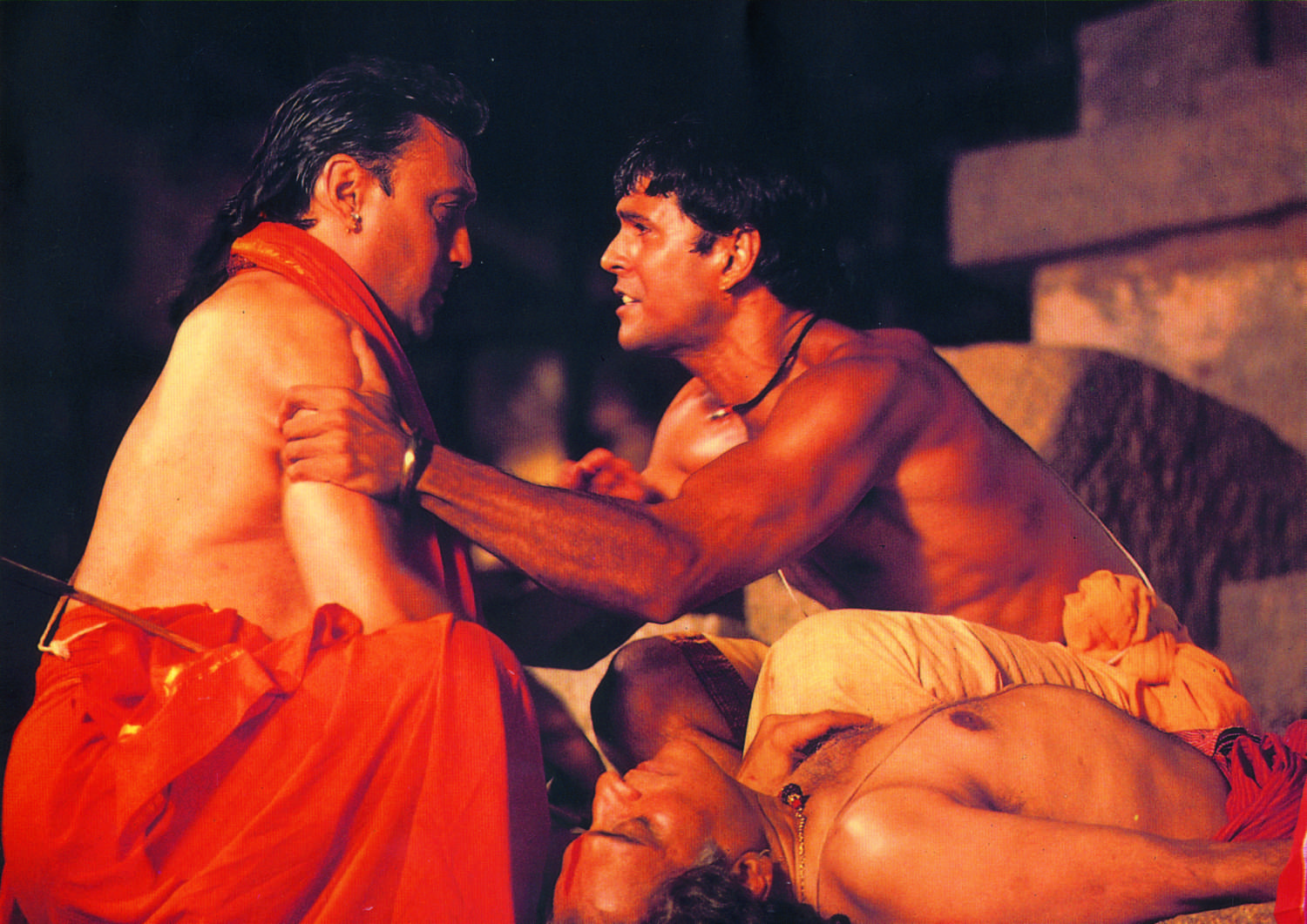Great basic material – unfortunately not so good final outcome is what one feels like after watching Agni Varsha. Yes the effort, earnestness is all there in the endeavours of the team involved but finally in spite of the fine cinematography, marvelous use of locations, a rousing background score you have a film that quite does not succeed. Some could argue that maybe the play on which it was based (Girish Karnad’s The Fire and the Rain) works as an intimate theatre piece but not so much in the medium of film. With Agni Varsha, however, what one feels is had the makers stuck to the basic plot of the play, it could have been a far superior 90-minute film, which could easily have held its own. In fact, what Agni Varsha has not lent itself to, is being adapted as a mainstream Hindi Film. The so-called commercial elements like the songs and dance just don’t work and in fact take away a good deal from the film.
Agni Varsha‘s story is derived from the myth of Yavakri, which is a part of the great Indian epic, the Mahabharata. The land has been in the grip of a ravaging drought for 10 years. In order to appease the Lord of Gods, Indra (Amitabh Bachchan), custodian of rain, a grand fire sacrifice is being conducted at the palace under the guidance of the Chief Priest, Paravasu (Jackie Shroff). As this sacrifice draws to its close, our story begins. Paravasu is the elder son of the great sage Raibhya (Mohan Agashe). For 7 years he has watched over the holy fire, forsaking his wife, family and every earthly pleasure. Paravasu’s young brother Arvasu (Milind Soman) is in love with a tribal girl, Nittilai (Sonali Kulkarni). Arvasu prepares to marry outside his Brahmin caste – but for this, according to the tribal custom, he has to present himself before Nittilai’s village elders. Paravasu’s cousin and bitter rival Yavakri (Nagarjuna) has just returned triumphant after 10 years of practicing austerities in the jungle, with the gift of universal knowledge from the gods. To seek revenge, Yavakri seduces Paravasu’s lonely wife, Vishakha (Raveena Tandon). This sets off an irrevocable chain of events that lead to Aravasu losing his love, Paravasu desecrating the great sacrifice, the creation of a demon and the deaths of Yavakri and Raibhya. Finally, the purity of Arvasu and Nittilai’s love brings salvation to the land.
Director Sajnani admits to opening up the play wherever necessary in order to adapt it for the big screen and while there is nothing wrong with interpreting something the way one sees it, one cannot help but feel Agni Varsha still works better when keeping it in mind as the theatre piece it was designed as. In fact, the film works best in the scenes where the makers have remained faithful to the play with scenes played out with just 2 or 3 actors rather then the other so-called ‘cinematic’ scenes (The less said about the Deepti Bhatnagar song the better). In fact, it was the script of The Fire and the Rain, which inspired Sajnani to make the film and a more faithful adaptation of that very script rather then bending to commercial compromises would have left Sajnani with a much better film. Incidentally, Sajnani did approach Girish Karnad to write the script for the film but Karnad refused. It would be interesting to see what his views are on the film now.
Coming to the actors, the big let down in the film are the central performances of Milind Soman and Sonali Kulkarni as Aravasu and Nitilai. Soman is no actor and finds the role way beyond him while Sonali Kulkarni as the low caste tribal girl in love with him has always been a much-overrated actress and why our filmmakers continue to think of her in roles she cannot do justice to is a mystery. The other performers – Jackie Shroff as Paravasu, Nagarjuna as the wily Yavakri, Raghuvir Yadav as the theatre manager are competent and efficient without being great but a special mention must be made of Raveena Tandon who impresses one with both looks and acting as Vishaka, the woman who is taken for granted by both the men in her life, Paravasu and Yavakri. As Lord Indra, Amitabh Bachchan depends on his charisma to carry his all too brief cameo through.
As mentioned before, the songs are a no-no as are the visual effects by and large (perhaps the only exception being the sequence where Jackie walks into the burning mandap). Dialogue too is inconsistent and yes, often trite with no consistent language.
The redeeming factors? Precisely just the elements mentioned earlier. Anil Mehta’s cinematography – vibrant with stunning use of the locales of Hampi and yet not standing out by itself but going along with the story flow, lifting the film several notches. And Taufiq Qureshi’s evocative background score.
Otherwise sadly, Agni Varsha joins that long, long list of films that fit into the ‘good effort but if only…’ category.
Hindi, Drama, Mythological, Color


